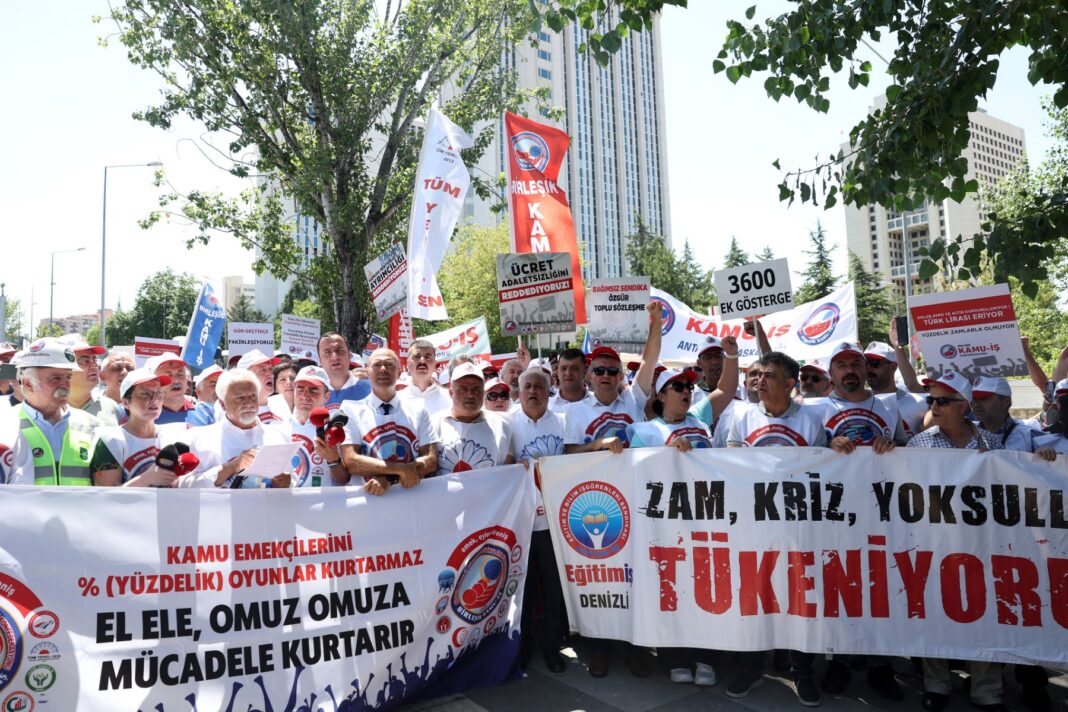Opposition parties and labor unions have criticized Turkish President Recep Tayyip Erdoğan for being out of touch with the daily problems of Turks, who are struggling with the increased cost of living caused by high inflation, following the latest 30 percent boost in the monthly minimum wage for 2025.
Erdoğan announced the decision on X on Tuesday evening, increasing the minimum wage to 22,104 Turkish lira ($630) from 17,002 lira in 2024, a move expected to impact more than 7 million workers.
Özgür Özel, leader of the main opposition Republican People’s Party (CHP), tweeted that the small increase in the minimum wage was “the latest sign that Tayyip Erdoğan has lost touch with the realities of this country.”
Bugün alelacele gerçekleştirilen Komisyon toplantısıyla belirlenen 22.104 TL'lik asgari ücret, Tayyip Erdoğan'ın bu ülkenin gerçeklerinden koptuğunun son emaresidir.
Günlerdir Suriye’de zafer yaşattık diyenler emekçiye hezimeti yaşatmış sefalet ücretini dayatmışlardır.
Suriye…
— Özgür Özel (@eczozgurozel) December 24, 2024
Özel also announced that in response to a call from civil society organizations in Ankara, he would participate in a rally to be held in Tandoğan Square on Saturday to criticize the government’s handling of the minimum wage issue.
İstanbul Mayor Ekrem İmamoğlu, also from the CHP, said the increased minimum wage was not even enough to cover one month’s rent in the city. He called on Erdoğan, whom he described as “out of touch with reality and the public,” to issue a decree for an additional increase in the minimum wage and announce that the wage would be set for six months, with a new adjustment to follow thereafter.
Hükümet bu akşamki kararıyla 9 milyon asgari ücretli çalışan ve aileleriyle resmen alay etmiştir. 22.104 lira İstanbul’da sadece 1 aylık kira parası bile değildir. Belli ki sorumluluk bize düşmektedir. İBB olarak Sosyal Yardımlar bütçemizde ciddi oranda artışa gitmemiz gerekecek.…
— Ekrem İmamoğlu (@ekrem_imamoglu) December 24, 2024
While Muharrem İnce, leader of the opposition Homeland Party, pointed out that the recent increase was well below the 47.9 percent inflation rate for November announced by the Turkish Statistical Institute (TurkStat), the Zafer Party’s vice chair for economy and development policies, H. Bartu Soral, reminded that the presidential palace spends 22,000 lira a minute, accusing Erdoğan of condemning millions of minimum wage workers and their families to hunger.
During a speech in parliament the nationalist opposition İYİ (Good) Party’s deputy group chair, Buğra Kavuncu, said the party received the president’s decision with “great sadness and astonishment.”
Sezai Temelli, deputy group chair of the pro-Kurdish Peoples’ Equality and Democracy Party (DEM Party), held Finance Minister Mehmet Şimşek responsible for the developments and called for his resignation.
Ergün Atalay, president of the Confederation of Turkish Trade Unions (Türk-İş), which announced last week that it had expected the minimum wage to be raised to TL 29,583, said in a press statement on Wednesday that a 30 percent increase “was not acceptable.”
Atalay also announced that unless “a fair adjustment” is made, Türk-İş will not participate again in the Minimum Wage Determination Commission, which consists of 15 members, with five representatives from each group: the government, workers and employers.
Confederation of Progressive Trade Unions (DİSK) Chairwoman Arzu Çerkezoğlu also stated that condemning millions to 22,000 lira means “mocking the working class and laborers, who produce all the values and beauties of this country.”
Meanwhile, social media influencer Kadir İpek was arrested on Thursday for insulting President Erdoğan after posting a sarcastic response, which included offensive language, to his announcement of the new minimum wage.
“If anyone says, ‘If it’s so easy to live on that amount of money, then you do it, you son of a bitch,’ but don’t pay any attention to this, we love you very much,” İpek said in a tweet addressing Erdoğan.
Economists predict that this minimum wage increase will contribute to rising inflation in the coming months. According to calculations by Reuters based on central bank studies, a 25 percent wage increase would raise annual inflation by between 1.5 and 5 percentage points.
Turkey’s inflation declined to 47.09 percent in November, down from an annual high of 75 percent in May, primarily due to tight monetary and fiscal policies. However, the improvement has been slower than previously forecast, according to the central bank.
